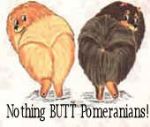& Much more
Some possible issues to be aware of with your youngster's tooth development.
RETAINED DECIDUOUS (PUPPY) TEETH
Most dogs lose their puppy teeth by 6 months of age. This process sometimes fails to occur in some toy and small breed dogs. Retained puppy teeth create numerous problems that can be eliminated through EARLY INTERVENTION AND EXTRACTION of affected teeth.
Adult tooth puppy tooth
Over-crowding is a problem because when there is an adult tooth and a puppy tooth present, both are occupying the same space. Oftentimes, there is no gum tissue between the adult and puppy tooth to prevent food and debris from entering the sockets and rapidly progressing to periodontal disease.
Orthodontic issues are also more likely to occur when deciduous teeth are retained because they push the adult teeth out of proper alignment and can lead to a great deal of pain for your pet. Major orthodontic procedures can oftentimes be avoided simply by extracting the deciduous teeth as soon as the problem is recognized (interceptive orthodontics).
THERE SHOULD NEVER BE A DECIDUOUS AND ADULT OF THE SAME TOOTH VISIBLE IN THE MOUTH AT THE SAME TIME! Immediate extraction of the deciduous tooth will increase the likelihood of the adult tooth erupting into the socket in a normal position.
Fractured puppy tooth draining abscess
FRACTURED DECIDUOUS TEETH exposes the pulp (blood and nerve supply inside of the tooth). Once exposed to oral bacteria, pain and infection occur and may eventually affect the permanent tooth that is developing nearby
Your Pomeranian's General Health
I know that because you care so much about your Pomeranian, you want to take good care of him/her. So I have summarized health concerns specific to Pomeranians to watch for. Some diseases and health conditions are genetic, meaning they are related to your Pomeranian. Veterinary practitioners consensus that impact this breed. This does not mean your dog will have these problems; it just means can be more at risk than other dogs.
I will describle the ost common issues seen in Pomeranians to give you an idea of what come up in the future.I cannot cover every possibility here, so please check back with me if you notice unusual signs or symptoms.
Dental Disease
Is the most common chronic problem in dogs and can affect 80% of all dogs by age of two years old. It commences with tartar build-up on their teeth and progresses to infection of their gums and roots of the teeth.


Above L/H (Periodontal disease) R/H photo the calculus removed (under general anesthetic/surgery).
Brushing your dog’s teeth daily will prevent periodontal disease as will feeding them with brisket bones regularly, which are devourable even when left outside in the open air for weeks. No harm will be caused by your dog chewing the old brisket bones until they are totally consumed - DO NOT FFED COOKED BONES from roast meats or BBQ chicken bones.
Infections:
Such as PARVO & DISTEMPER which are preventable through vaccinations which your vet will recommend in your area. Here in Queensland, you only require your Pomeranian to be vaccinated with a C5 vaccination if you plan to place your Pomeranian into a commercial boarding kennel.
Obesity:
Obesity can be a significant health issue in Pomeranians. It will cause or worsen joint problems, metabolic and even digestive disorders, back pain and heart disease. You may be tempte to give your dog food when you see them looking at you with those expressive eyes, you do not want to "love them to death" with leftover human foodstuff and doggie treats. Instead give them a hug, brush them or play a game with them or better still take them for a walk.
Parasites:
Many kinds of worms and other bugs can invade your beautiful Pomeranians body, inside and out. From fleas & ticks to ear mites which can infest their skin and ears. Heartworm, hookworm, roundworms and whipworms, tapeworms which can get into their system via their drinking unclean water, walking on contaminated soil or being bitten by an infected mosqiuto. Tapeworms can be transmitted to you or you family and a serious concern in a small dog, and to you. So it's important to test on a regular basis and I recommend preventative medication as necessary to keep them healthy.
Predispositions (Genetic) for Pomeranians:
Heart Disease:

Pomeranians can be prone to multiple types of heart disease, which can appear both early or late in life. Your vet will listen for a heart murmur or abnormal heart rhythm when examining them. Here at Tooshay Pomeranians each baby puppy is thoroughly examined by a vet prior to leaving my home. I take pride NOT to breed with a health issue Pomeranian or with bad temperamental demeanour dogs, for example a nasty temperament i.e. a snappy dog.
Dental care and weight control go a long way in preventing heart disease as does mosquito control here in tropical Queensland help prevent heart worm development. Your Vet can do a blood test to ensure your puppy is not affected with heart worm prior to doing an annual heart worm vaccination. I recommend this annual hert worm vaccination as a good option.
Patent Ductus Arteriosus:
Is when a small vessel that carries blood between two parts of the heart does not close shortly after birth as it should. The results are too much blood being carried to their lungs, fluid build-up, and strain on the heart. Outward signs may be mild, or you may see coughing, fatigue during exercise, weight loss, shortness of breath, or weakness in the hind limbs. The vet listens for a specific type of heart murmur to diagnose this problem during an examination. The vet may recommend surgery to close the problematic vessel.
Contact Details
Taryn Jones
Rockhampton, Central Queensland, 4702
Facebook: https://www.facebook.com/pages/Tooshay-Pomeranians/503745683040651
Tooshay Poms [email protected]




